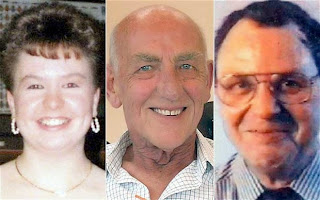For Immediate Release
 |
| Margaret Dore |
Contact: Margaret Dore (206) 697-1217
Dore has had two clients whose fathers signed up for the lethal dose:
“Even if you like the concept of assisted suicide, SB 128 is the wrong bill.”Seattle, WA -- Attorney Margaret Dore, president of Choice is an Illusion, which has fought assisted suicide legalization efforts in many states and now California, made the following statement after the California Senate Appropriations Committee passed SB 128 on May 28, sending the assisted suicide bill to the Senate floor.
"SB 128 is sold as giving people an 'end of life option,’” Dore said. “The fact is this bill is about ending the lives of people who aren’t necessarily dying anytime soon, and giving other people the ‘option’ to hurry them along."Dore, an attorney in Washington State where assisted suicide is legal, explained,
“In my law practice, I started out working in guardianship, wills and probate, and saw abuse of all kinds, especially where there was money involved (where there's a will, there are heirs). Then, in 2008, I got dragged to a meeting about our assisted suicide law and saw the perfect crime: your heir could help sign you up, and once the lethal dose was in the house, there was no oversight. Not even a witness is required. If you struggled, who would know?"
“If enacted, California’s SB 128 will allow assisted suicide (and euthanasia), with or without consent,” Dore said. “And in case I’m being too subtle, the drugs used are water and alcohol soluble, such that they can be injected into a restrained or sleeping person. After the person dies, the death certificate is REQUIRED to reflect a natural death. It’s the perfect crime.”The California bill and Washington’s law are both based on a similar law in Oregon.
Dore has had two clients whose fathers signed up for the lethal dose:
“In the first case, one side of the family wanted the father to take the lethal dose, while the other did not. He spent the last months of his life caught in the middle and traumatized over whether or not he should kill himself. My client, his adult daughter, was also traumatized. The father did not take the lethal dose and died a natural death.”In the other case, Dore said
“It's not clear that administration of the lethal dose was voluntary. A man who was present told my client that his father refused to take the lethal dose when it was delivered (‘You’re not killing me. I’m going to bed’), but then he took it the next night when he was high on alcohol. The man who told this to my client later recanted. My client did not want to pursue the matter further.”SB 128, like the Washington and Oregon laws, seeks to legalize assisted suicide for people with a “terminal disease,” which is defined in terms of a doctor’s determination of less than six months to live. In real life, such persons can have years, even decades to live. This is true for many reasons.
“Doctors can be wrong about life expectancy, sometimes way wrong," Dore said. "This is due to actual mistakes: They evaluated another patient’s test results. More typically, however, doctors are wrong because predicting life expectancy is not an exact science. A couple of years ago, I was picked up at the airport by a man who at age 18 had been diagnosed with ALS, and given 3 to 5 years to live, at which time he was predicted to die by paralysis. This had been confirmed by the Mayo Clinic. When he picked me up, he was 74 years old. The disease progression had stopped on its own.”
“Another reason that patients can have years, even decades, to live is that the definition of “terminal” as six months to live is a determination of lifespan without treatment, Dore said. “Consider my friend, Jeanette Hall, diagnosed with terminal cancer in 2000, who was adamant that she would use Oregon’s law. Her doctor convinced her to be treated instead. She is still alive today, 15 years later.”In Oregon, people with chronic conditions, such as diabetes, are “terminal” for the purpose of assisted suicide. Oregon doctor, William Toffler, explains: People "with these conditions are considered terminal if they are dependent on their medications, such as insulin, to live…such persons, with treatment, could otherwise have years or even decades to live."
“If SB 128 becomes law, people with years, even decades to live, will be encouraged to throw away their lives; patients and their families will be traumatized,” said Dore. “SB 128, as written, will, regardless, allow the perfect crime. Even if you like the concept of assisted suicide and euthanasia, SB 128 is the wrong bill.”For more detail and backup documentation about problems with SB 128, go here.
































